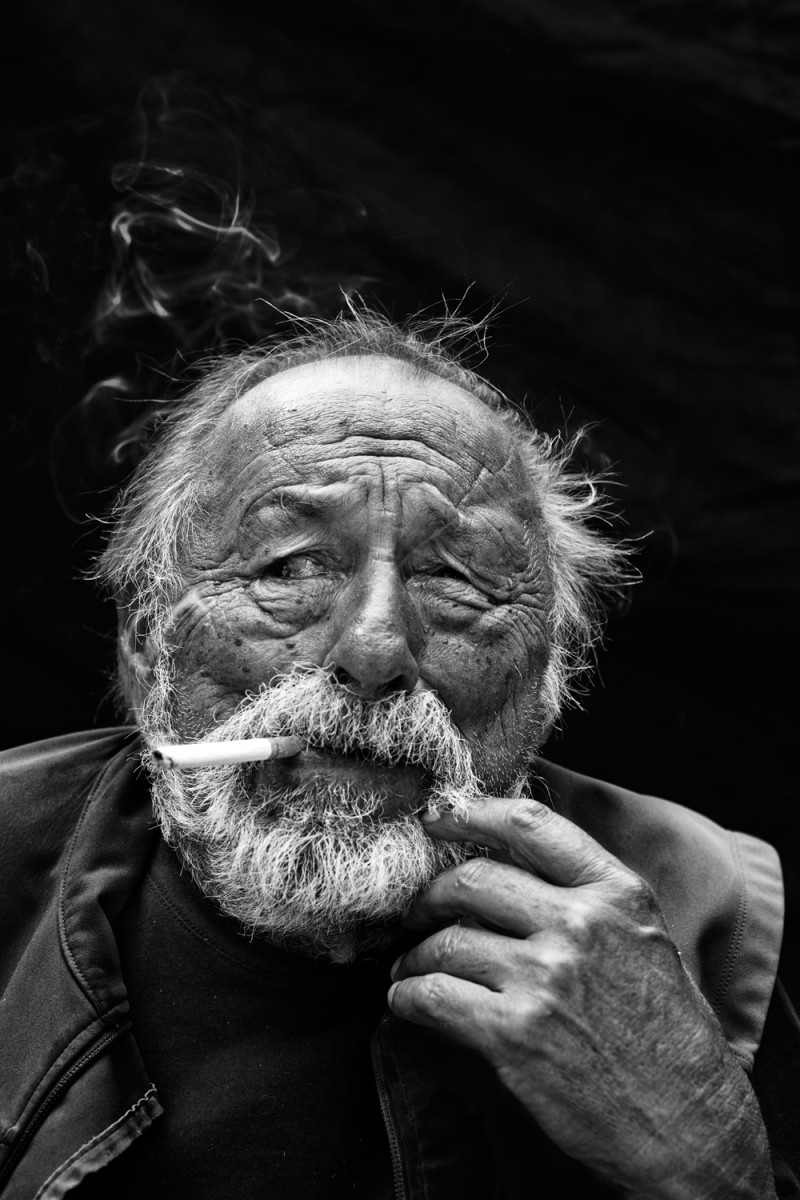 Author Photo of Jim Harrison for Dead Man’s Float, Andrew Anderson
Author Photo of Jim Harrison for Dead Man’s Float, Andrew Anderson
Harrison
I skip church once in late fall,
and sit under a sequoia instead
to read Jim Harrison’s last poems.
Halfway through, I turn the book over
and look into the face of his photo.
Cracks like rivers etch across his
whole round face–a scarred moon
haloed with thin white hair and smoke.
Even his good eye is hazy, even
the bad one sees better than most.
He’s not wearing a shirt, which I know
from the poems is because of the pain
in his skin. I’ve never been too happy
or too pretty for anything I’ve wanted
in life until now: to write poems like these.
But time goes quickly lately and who knows
what the end will bring me and
what it will take away.
_____________________
Mary Giudice
Review by Tom Barlow
The floor here is swept
a straw from the broom remains
such is my progress
My first takeaway for this poem is the feeling it evokes, one of reverence, regret, and a surrender to inevitability, the way Harrison’s death was foretold by the disease as mentioned in the moving image of him without a shirt, to avoid the pain of it on his skin. It shows skilled pacing and takes the image of Harrison into a deeper place, one we recognize. So would he.
The speaker emerges in the line “I’ve never been too happy”; their description of Harrison’s face is used as a way to introduce their longing and ambivalence. The title introduces the setup for the poem, but could possibly do more work to establish reader expectations that there is more here than homage. The turn in the poem comes with the peek inside the mind of the narrator, at an appropriate time, having described Harrison just enough; delaying the turn more would have been problematic.
The language here is plain spoken, which fits with Harrison’s style. The ending of the poem is a bit on the nose, where he might have used an image, perhaps echoing back to the facial description, to imply the thought.
The line that suggests the narrator regrets he/she is too happy or too pretty to write poems like Harrison’s is fascinating, reminding me of a musician who regrets he has not suffered enough to play the blues.
Altogether an impactful poem, even more so for one who appreciates Harrison’s work. Well done.
Review by Mykyta Ryzhykh
Would you skip church for Harrison? Would you trade a tech party for reading under a redwood tree? What do you even know about pain, except: “He’s not wearing a shirt, which I know from the poems is because of the pain in his skin”? And in general, sometimes it seems that we are all created “to write poems like these”.
Review by Jared Pearce
I once skipped church to finish reading Larkin’s collected poems—it was a fine way to spend a Sunday, though not a happy way, as Larkin’s poems don’t generally lead to a rosy view of life. (Except for The Mower—I liked that one.) And I find an interesting move in this poem: the speaker, admittedly happy and beautiful, supposes that life might at some time in the future, make her ugly and sad enough to write poetry. Sure, Larkin was, I think many would agree, no beauty, but I’m not sure why poems have to come from ugliness or sorrow in order to be striking, or even why or if we have those notions when we’re young, or, maybe, that those ideas, while I’m not sure are correct, are actually correct? At least, this poem, while saying as much, might prove the opposite.
Review by Anastasia Vassos
The first line Harrison is so interesting: “I skip church once” – at first it occurred to me that the verb tense is wrong. Then I experimented reading the poem without the word “once.” This tells me that the speaker is a regular church-goer, as well as a lover of poetry. For this reader, the introduction resonates of the mystical and spiritual nature of poetry itself. The speaker has skipped church, but the reader is firmly implanted in the religion of poetry with that first line. The turn “I’ve never been too happy/or too pretty for anything I’ve wanted” is arresting, surprising – what does it mean to never be too pretty for anything one wants? I don’t care what the line means: I love it. And the line gets to the heart of it all: to write beauty before the end, before the mystery.
